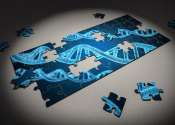Researchers find potential therapy for rare but devastating lung disease
A treatment for a rare cancer-like lung disease found in women of childbearing age may have been discovered by University of Cincinnati researchers.
Jun 15, 2023
0
41
A treatment for a rare cancer-like lung disease found in women of childbearing age may have been discovered by University of Cincinnati researchers.
Jun 15, 2023
0
41

Patients with tuberous sclerosis complex, a genetic disorder characterized by the growth of noncancerous tumors in multiple organs of the body, have limited treatment options. A team led by investigators at Massachusetts ...
Jan 9, 2021
0
124

A new study in Neuron focuses on the role that a lack of the protein "CLOCK" plays in several forms of epilepsy. The study provides evidence that excessive excitation of specific brain cells may be due to a lack of CLOCK ...
Oct 11, 2017
0
100

Tuberous sclerosis complex (TSC), a genetic disorder that causes autism in about half of those affected, could stem from a defect in a basic system cells use to recycle their mitochondria, report scientists at Boston Children's ...
Oct 18, 2016
0
616

A team of researchers led by UCL Great Ormond Street Institute of Child Health (ICH) and Great Ormond Street Hospital (GOSH) has found that metformin—a drug commonly used to treat Type 2 diabetes—can successfully reduce ...
Mar 29, 2021
0
279

Tuberous sclerosis complex (TSC) afflicts as many as two million people around the world, affecting multiple organs, including lungs, brain, skin and kidneys. In about 80 percent of cases, it causes cysts and benign tumors ...
Feb 4, 2021
0
11

Tuberous sclerosis complex (TSC) is a neurological disorder causing non-cancerous tumors, called cortical tubers, to grow throughout the brain and body, as well as other conditions like epilepsy and autism. While medications ...
Jun 24, 2020
0
0
The current idea about how tuberous sclerosis occurs places mTORC1, a protein complex that regulates cell metabolism, as the major driving force behind the disease. But according to a new study published in the Proceedings ...
Feb 7, 2019
0
560

New research on autism has found, in a mouse model, that drug treatment at a young age can reverse social impairments. But the same intervention was not effective at an older age.
Oct 9, 2018
0
10

Addressing a critical issue for people with a genetic disorder called tuberous sclerosis complex (TSC), doctors at The University of Texas Health Science Center at Houston (UTHealth) reported that a skin cream containing ...
May 23, 2018
0
2
